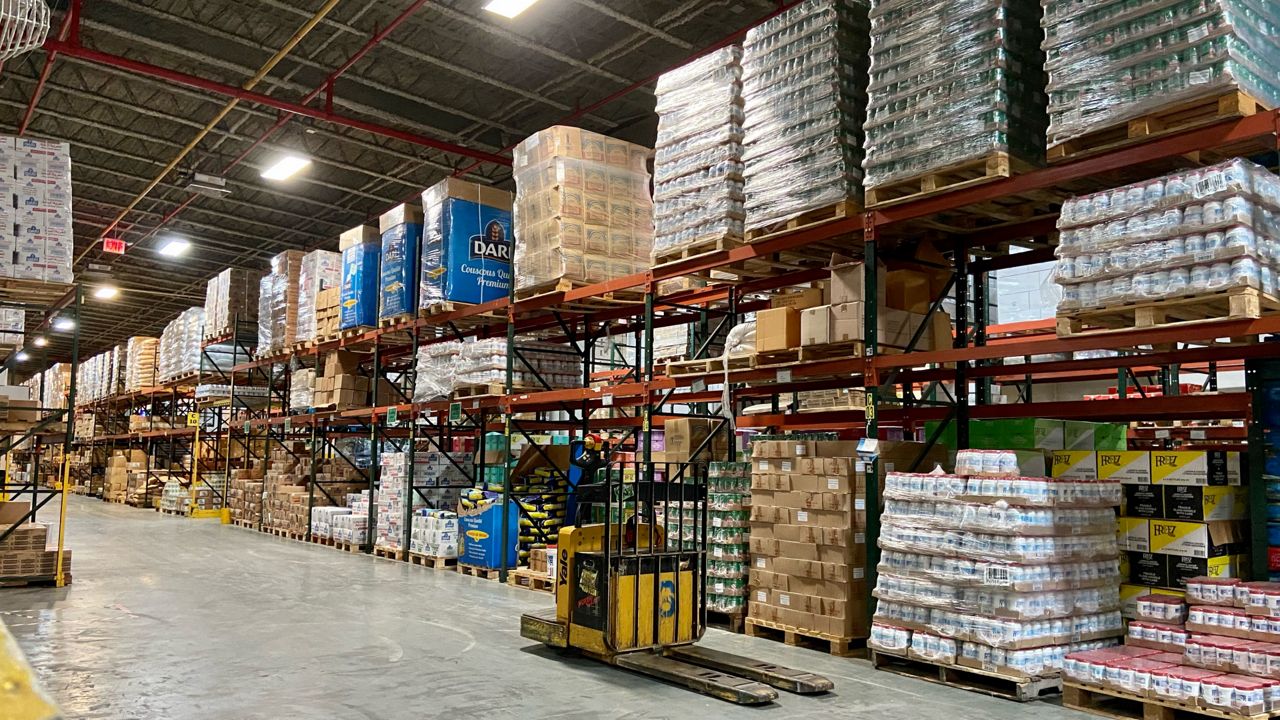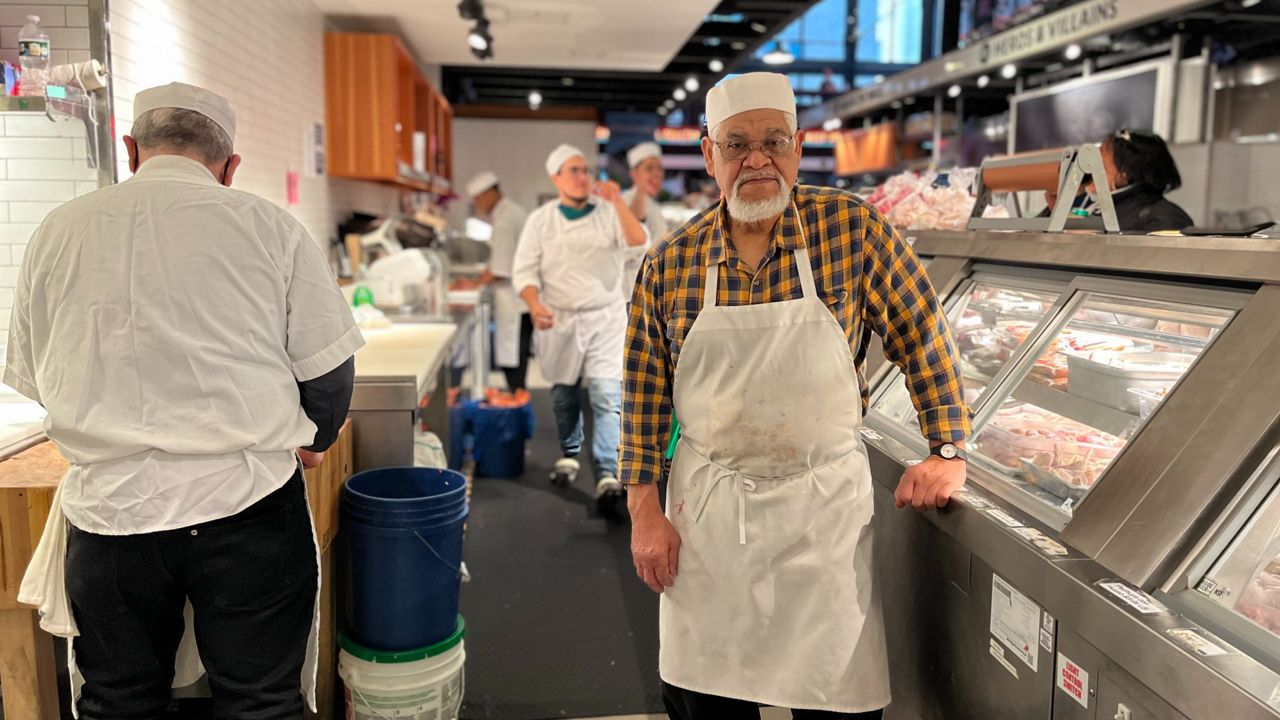Rib-eye steaks are up $5 per pound over last year, and whole turkeys are up by 30%.
But Juan Luis Rodriguez, the owner of the Luis Meat counter in the Essex Street Market, is still selling pork shoulder – pernil, in Spanish – at a modest $5.99 per pound. The meat is a holiday staple for Hispanic families that have been buying from Rodriguez for decades.
Rodriguez refuses to raise the prices for loyal customers who will together buy more than 150 shoulders in the days before Thanksgiving, and even more before Christmas, even as delays and supply chain issues force the price of all of his products – and everyone else’s – up.
“This year, I'm paying double the price over last year, for everything,” Rodriguez said in a recent interview at his meat counter. “I don't make very high the price, because I got customers now for a very long time.”
Businesses in every industry are facing rising costs, delayed shipments and slimmer margins caused by supply chain issues across the globe, and the issues are affecting the food business more directly than most. During what would typically be their best months of the year, during the rush of parties and family gatherings around the holidays, they are doing their best to swallow near-constant price increases to keep customers coming back.
With no end in sight for the problems ransacking global shipping – including high energy costs, a labor shortage and high consumer demand – New York City food businesses are increasingly concerned over how long they’ll be able to ride out the volatility.
“I've never had to navigate anything like this in my life,” said Pat Whelan, the managing director of Sahadi’s Fine Foods, a major importer and wholesaler of Middle Eastern food products based in Brooklyn. “Every single day: price increase, price increase, price increase, price increase, container problem, trucking problem, rail line problem.”

"We can’t wait it out"
After a year and a half in a pandemic economy, businesses are still dealing with new and worsening problems being thrown their way, said Randy Peers, the president of the Brooklyn Chamber of Commerce.
“There's a lot of fatigue overall,” he said.
They are contending with shipping prices that have gone up by leaps and bounds, as prices for containers go up by thousands of dollars. A new United Nations report found that shipping container costs could send consumer goods up by 1.5% across the board, with products like clothing and furniture jumping by more than 10%. The U.S. is still facing a labor shortage across many industries, as workers retire early, start their own businesses or switch to jobs that can be done from home, such as customer service.
Then there are the delays. Everyone from Mercedes-Benz of Brooklyn to Tarzian Hardware in Park Slope is having trouble getting their products in on time, Peers said.
And though the flow of stimulus money from the federal government has ended, some pandemic-era legislation could still be hiding the true economic toll of the disruption.
“We're still existing under an evictions moratorium, which means it's an artificial marketplace right now,” Peers said. “Yet the rent bill could be accumulating.”
Whelan said he abandoned their established ordering and selling practices months ago. They began doubling and tripling their orders in the spring, adding warehouse space wherever they could. In the summer, they stopped issuing monthly price updates to wholesale products, and now raise prices every week.
Sahadi’s salespeople now confirm every order with purchasers, he said, because otherwise, a small deli that ordered chickpeas for hummus may not realize the price of the legumes went up 40% over last month.
Those changes are going to reach Sahadi’s retail customers soon, too, he said, after months of them trying to “eat their margins” and keep prices as low as possible on packaged foods and groceries.
“We've come to the realization, we can't wait it out,” he said. “That means you raise prices during the holiday season, which you never want to do. You don't want to look like you're taking advantage of people.”
"Going to get worse"
While all these changes stem from the disruptions caused by the pandemic, the supply chain issues are being compounded further by consumer shopping trends, according to G. Tony Bell, a professor of supply chain management at Rutgers University.
American retail spending is hot. The National Retail Federation recently estimated that holiday sales could grow as much as 10.5% this year, to an all-time high of $859 billion. Consumers will spend on average about $1,000 in holiday purchases, including food.
While it’s propping up the economy, it puts pressure on supply chains to deliver goods faster than they can right now, Bell said.
“That elevated demand or pent-up demand isn't really helping us from a supply chain standpoint, because of the constraints that we already have in place,” he said.
Bell believes that our supply chain issues could stick around for another six months to a year, or even longer.
The answer, he said, is to buy local as much as possible. If you can’t get what you want from an online retailer in time, find a similar version at a local store, and buy food that is raised as close to the metro area as possible. Those products don’t have to wait at a port to be unloaded off a container ship.
“It's a shorter lead time, a less complex supply chain,” he said. “We don't have to rely on a product that's coming from overseas, that’s getting stuck on the ocean.”
The steady purchasing is still coming at the cost of many businesses’ margins, Peers said, even as it helps the overall economy recover more quickly than many economists expected.
He is hopeful that consumers will be willing to overlook gaps in products and offerings caused by supply chain disruptions, a trend he says he already sees at restaurants, where many kitchens are paring down menu offerings to address limited food item availability.
“I think it's going to get worse before it gets better,” he said. “This holiday season is going to be a good litmus test for how flexible consumers really want to be.”



